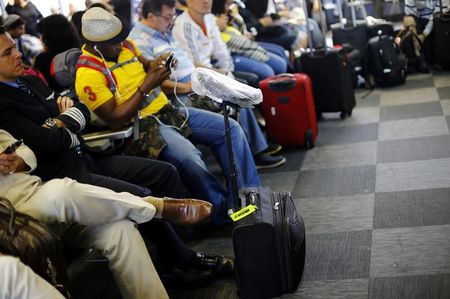By Paul Carsten
BEIJING (Reuters) - A Chinese regulator is conducting an anti-monopoly investigation into Microsoft Corp over its Windows operating system, in the latest of a growing number of competition probes that have unnerved Western firms in China.
China's State Administration for Industry & Commerce (SAIC) is also investigating a Microsoft vice president and senior managers, and has made copies of the firm's financial statements and contracts, the agency said on its website on Tuesday.
It said Microsoft, which has struggled to make inroads in China due to rampant piracy, has not fully disclosed information about Windows and its Office software suite.
Microsoft is one of the biggest U.S. companies to fall under the eye of Chinese regulators as they ramp up their oversight in an apparent attempt to protect local companies and customers.
The investigation comes as U.S.-China business relations have been severely strained by wrangles over data privacy.
Investigators raided Microsoft offices in Beijing, Shanghai, Guangzhou and Chengdu on Monday.
The SAIC said it had obtained documents, e-mails and other data from Microsoft's computers and servers, adding that it could not complete the investigation as Microsoft had said some of its key personnel were not in China.
Microsoft has been suspected of violating China's anti-monopoly law since June last year in relation to problems with compatibility, bundling and document authentication, the statement said.
Microsoft said it complies with laws and regulations of every market where it operates. "Our business practices in China are designed to be compliant with Chinese law," a representative said in an emailed statement.
The SAIC statement said the raids were prompted by reports from other companies, without naming them.
DETAILS MURKY
But mystery surrounds the probe, with industry experts and lawyers questioning what, if any, violations Microsoft can have made in China, where the size of its business is negligible.
It is still unclear how exactly Microsoft violated China's anti-monopoly law, said Duncan Clark, chairman of Beijing-based tech consultancy BDA.
"It's ironic they can be accused of a monopoly in a mostly pirated operating system market, as they were criticised for ending support to mostly non-paid versions of Windows XP," said Clark, referring to Microsoft halting support for the 13-year-old operating system in April.
Microsoft does have a wide range of operations in China, including research and development and teams for products such as Windows, Microsoft Office, servers, entertainment and hardware.
But its revenues for China, which Microsoft does not break out in its earnings statements, are very low. Sales are disappointingly low for a market of 1.4 billion people, said a former employee.
Former CEO Steve Ballmer reportedly told employees in 2011 that, because of piracy, Microsoft earned less revenue in China than in the Netherlands, even though computer sales matched those of the United States.
Some lawyers, however, said it could be argued that Microsoft enjoyed a monopoly in China, despite the fact that the vast majority of copies of Windows and Microsoft Office are pirated.
"Microsoft really has a dominant market position. People rely on it very much and its market share is very high, so this would likely lead to an abuse of its dominant market position," said Zhan Hao, a Beijing-based managing partner at Anjie Law Firm.
"Alternatively, Microsoft could (through its market position) restrict competition for other business and competitors," he said, adding that Microsoft, if found guilty may be fined 1-10 percent of its China revenue.
China's anti-monopoly law does not say whether the 1-10 percent of revenues that companies can be fined when in violation refers to domestic or global sales.
TECH SECTOR TENSIONS
Qualcomm Inc, the world's biggest cellphone chip maker, is facing penalties that may exceed $1 billion (£590.18 million) in another Chinese anti-trust probe, following accusations of overcharging and abusing its market position.
The U.S. Chamber of Commerce earlier this year urged Washington to get tough with Beijing on its increasing use of its six-year-old anti-competition rules, noting that "concerns among U.S. companies are intensifying."
Revelations by former U.S. National Security Agency contractor Edward Snowden have also caused friction, with Chinese state media calling for "severe punishment" of tech firms they say have helped the U.S government to steal secrets and monitor China.
Tensions increased in May when the U.S. Justice Department charged five members of the Chinese military with hacking the systems of U.S. companies to steal trade secrets.
The SAIC investigation into Microsoft could be read as a public retaliation for the U.S. cyber espionage revelations and the Justice Department indictments, BDA's Clark said.
The latest move by China's authorities caps a rocky period for Microsoft in the country. Earlier this month, activists said Microsoft's OneDrive cloud storage service was being disrupted in China.
In May, central government offices were banned from installing Windows 8, Microsoft's latest operating system, on new computers. This ban appears not to have been lifted, as multiple procurement notices since then have not allowed Windows 8.
Nevertheless, the company has pushed forward with plans to release its Xbox One gaming console in China in September, forming distribution ties with wireless carrier China Telecom Corp and e-commerce company JD.com Inc.

(Reporting by Paul Carsten; Additional reporting by Beijing Newsroom and Bill Rigby in Seattle; Editing by Alex Richardson and Richard Chang)
